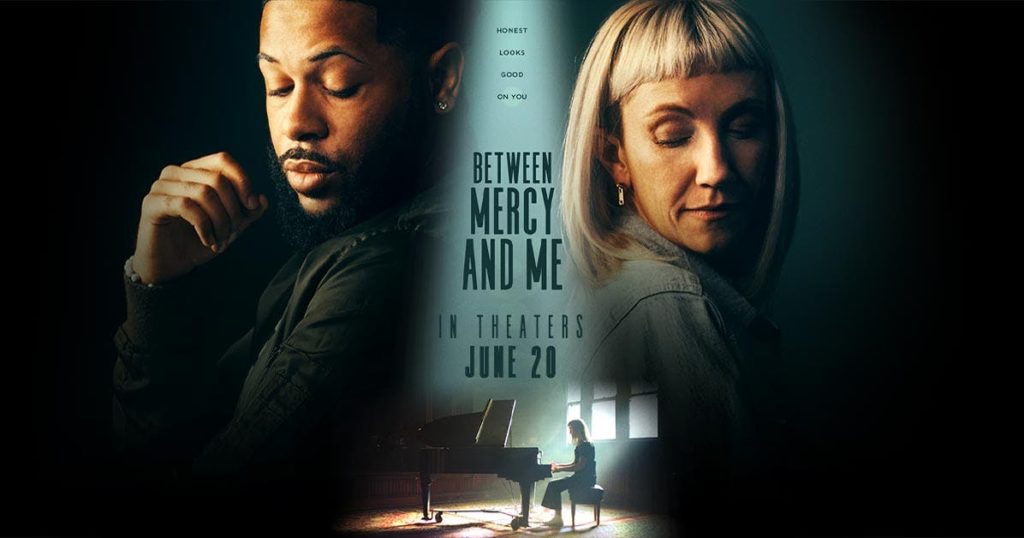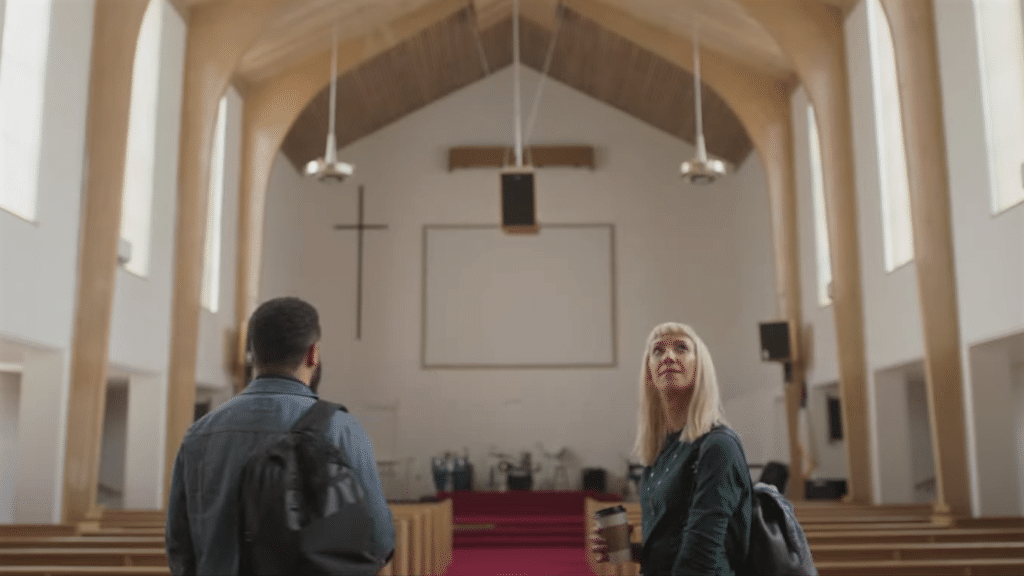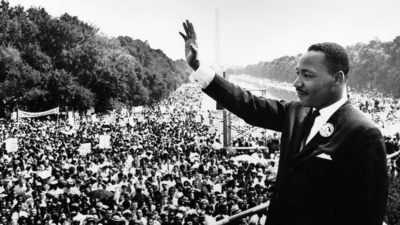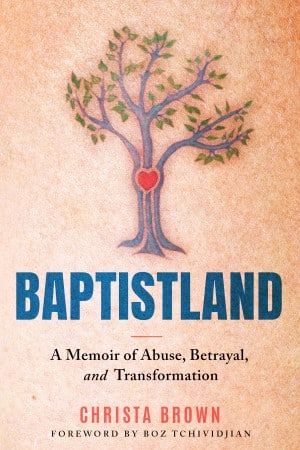The film “Between Mercy and Me” centers on Hugo and Mercy, a Black man and White woman who bond over their love for music but find themselves drawn into conflict over the racial division in their city that threatens to divide them as well.
Faith-based dramas typically do not deal with the issue of race. Tyler Perry movies aside, the only Christian racial drama I can recall in the past 20 years was an intense racial melodrama called “Grace Card” back in 2010. That one was not especially well reviewed or a box office success. So it’s not surprising Christian films haven’t tackled the problem much since.
But “Between Mercy and Me” writer/director Craig Lamar Brown wasn’t making the movie because he knew it would be a hit, but because he saw how the toxic racial discourse was harming the country.
“The whole George Floyd thing happened, and I just looked at how the world responded to what happened to him being killed,” he said. “And there was just a lot of disconnect, especially within the church around how to talk about race in a healthy and productive way. And I’m like, ‘Man, this is terrible.’ Everyone’s social media feed was just on fire. It was like, guys, we missed this. We picked sides. We picked left and we picked right, and it didn’t add anything to fight what was happening.”
So Brown started working on a movie that would talk about these issues and create a model for Christians to talk about them going forward. He drew from his own experiences of being a Black Christian man who married a White woman and tried to craft a story that would help both Black and White Christians understand each other.
Your tax-deductible gift helps our journalists report the truth and hold Christian leaders and organizations accountable. Give a gift of $30 or more to The Roys Report this month, and you will receive a copy of “Baptistland: A Memoir of Abuse, Betrayal, and Transformation” by Christa Brown. To donate, click here.
“I just took from what I saw in culture,” he said. “I’m like, ‘All right, well this is where we’re at. We have anger and frustration on one side, and we have passivity on the other side. So how do we fix this?’ And so I took a Black worship leader and I took a White worship leader, two leaders in the church to really look at perspective. I feel like in a lot of these conversations around race, that’s what we miss, is perspective.”

Craig Lamar Brown is one of a growing number of Christians who are tired of what they see as the toxic and polarized discourse about race from American Christians and are charting another path forward. Black Christian sociologist George Yancy described the racial gridlock in the country in his book “Beyond Racial Division” as a war between “colorblind” advocates, who want to pretend systemic racism doesn’t exist, and “anti-racists,” who promote a combative war strategy for defeating racism that involves silencing the voices of White people in the conversation.
You see this reflected in the American movies being made today as well. Modern movies tend to either be “colorblind” and not talk about race, or talk about race in a bitter, “us versus them” way, whether it’s “Dear White People,” “Get Out,” “Sorry To Bother You,” “If Beale Street Could Talk,” “Da Five Bloods,” “Queen and Slim,” or “Judas And The Black Messiah.”
This is partly what makes “Between Mercy and Me” so compelling. It shockingly is both honest about race and graceful and nuanced in a way I don’t know how often if I’ve seen before — whether in Christian or secular film.
The movie is constantly giving room to the perspectives of Hugo and Mercy on their life experiences and perspectives on race, as well as those of their families, friends and larger communities. The film does not shy away from the pain Hugo has gone through as a Black man nor the added pain when White friends (or girlfriends) minimize that pain. Likewise, it doesn’t shy away from the pain of well-meaning White people who “show up to every hard conversation” and are punished for doing so by people unwilling to forgive.
The movie is equally nuanced with intra-racial debates. Who’s responsible for bad life circumstances, the system or the individual, is a question that’s alive even in Hugo’s community. Is Hugo’s friend bad for being a drug dealer? Or is it the fault of Hugo’s father for the way he treated Hugo’s friend’s father? Or is it Hugo’s friend’s father’s fault? The movie dives into those debates better than most race movies I’ve seen in ways that made me really think and empathize.
Beyond that, the movie is a pretty standard Christian romance melodrama — for good and ill. The two leads are charming and likable, and one likes seeing their relationship grow and overcome its challenges. Most of the characters are likable, and if you stick through the worthwhile difficult conversations, the warmth of the ending is very gratifying. The predictability also provides an anchor for some of the uncomfortable conversation.

However, because the movie’s dialogue and filmmaking are pretty basic in execution, the themes and messages don’t carry quite the same kinetic and persuasive power as some of the racial movies I mentioned earlier — even though its message is superior. Even in the area of music — which is a big focus — the film feels forgettably conventional next to the insane musical dynamism of Damien Chazelle films like “Whiplash” or “Babylon.”
None of this makes the movie bad. But it does mean that if you’re seeing this movie, you’re seeing it for the radically thoughtful faith-based racial conversations rather than coming to be entertained and getting those as a bonus.
And I hope people do see this movie. It’s one of the first pieces of media to truly bring to life a vision of racial conflict and reconciliation that is both graceful and honest, both faith-central and practical in its application to one’s own life.
Craig Lamar Brown hopes this will move the needle for Christians to confront their own prejudices and have more conversations going forward.
“The hope of this film is that again, just more honest conversations will come up,” he said. “As much as I want it to … change our minds, our hearts forever, that’s not reality. But the hope is that you can just go another step further wherever you’re at. It can’t be a one-size action step for everyone; it could be a small one for someone.”
He added: “It could be, you know what? I am going to hold the door open for someone who’s Black. I’m going to go out of my way to serve someone who’s Black or to have a conversation. That could be a big step for a lot of people. Or another step for someone could be a White father allowing his White daughter to date a Black man. That could be a step. Vice versa.”
“Between Mercy and Me” is in theaters for one day only on June 20.
This article originally appeared at Religion Unplugged.
Joseph Holmes is an award-nominated filmmaker and culture critic living in New York City. He is co-host of the podcast The Overthinkers, where he discusses art, culture and faith with his fellow overthinkers.




















